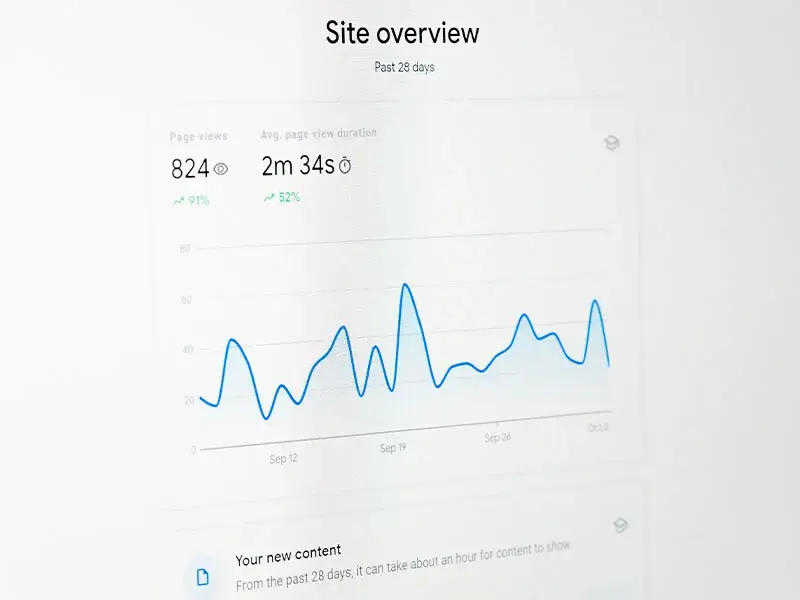Used as part of your law firm’s online marketing strategy, SEO can be very a very effective way of generating affordable enquiries.
Summary of one of our SEO case studies:
In 2021, an owner of a small (>2 staff) Midlands-based employment law firm reached out to our agency asking for help.
Their website comprised over 100 pages of content that were said to have been previously optimised by an SEO expert.
Unfortunately, the website was not generating enough work for the firm. Following one of major Google updates in 2021, the enquiries significantly reduced.
The firm solely wanted to improve its website and SEO. They did not want to run a PPC campaign.
With the help of our SEO expert Ewelina, improvements to the website, and an SEO cleanup, the law firm saw its traffic double within 3 months.
The number of organic employment law enquiries increased to 4 a day (after 12 months of continuous SEO work).
What is Law Firm SEO?
Law firm SEO is the practice of increasing visibility and driving traffic to your law firm’s website. To achieve this, an SEO expert will use various optimisation techniques. These may include:
- improving your website architecture and navigation,
- Identifying and fixing website errors and issues,
- Improving your website’s user experience (UX), including loading speed,
- Creating and publishing quality content that meets Google’s guidelines,
- And much more.
You may have already tried and paid an SEO provider to generate more enquiries. But they may have left you feeling unsatisfied.
Unfortunately, as an agency specialising in the legal sector and with experience of working within legal firms, we have heard numerous stories about SEOs who didn’t deliver on their promises.
However, by learning the basics of SEO, you can gain a deeper understanding of what it takes to become more visible online.
More importantly, you can learn enough to see if your SEO specialist is doing the work required to get your website where you want it to be.
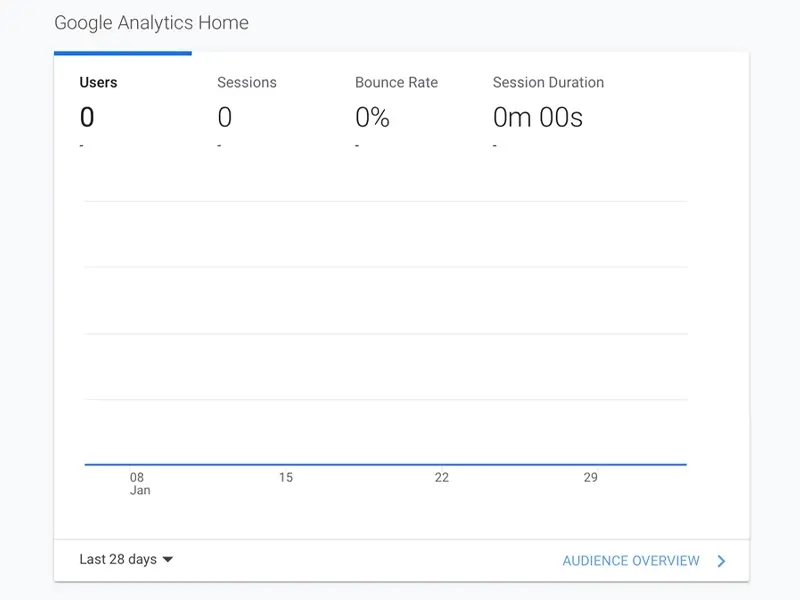
Does my law firm need SEO?
It depends.
If you already have a steady source of enquiries, your law firm’s existence certainly will depend on using legal SEO.
However, no matter how many trusted sources of enquiries you may have established as a law firm, developing more is always a good idea.
Especially, if you want your law firm to grow. Or, if you don’t want to depend on others to deliver you new cases.
Furthermore, if you already have a website, you could make it work for you and get a good ROI…
Increasing website visibility
As of December 2022, there are 9622 law firms and 156405 practising solicitors in England and Wales.
If you Google your area of law, you will see your competition.
PPC advertisements and local law firms may be dominating your search results.
This may make you wonder if it’s at all possible to stand out among so many firms.
It certainly is.
The number and types of search queries people make daily is enormous.
And all of these search queries can be targeted to generate work.
SEO can help you generate more enquiries than competing law firms with less investment than PPC.
Done well, the results of SEO can also be long-lasting.
How important is SEO for Law Firm Websites?
- About 50% of all Google searches are for local services. With SEO, you can increase your presence in your local area.
The most valuable aspect of having a well-maintained and optimised website is that it can help you compete against large law firms.
If you can show yourself in search results for ‘How to…’ and ‘Can I…’-types of keywords, you will get more conversions.
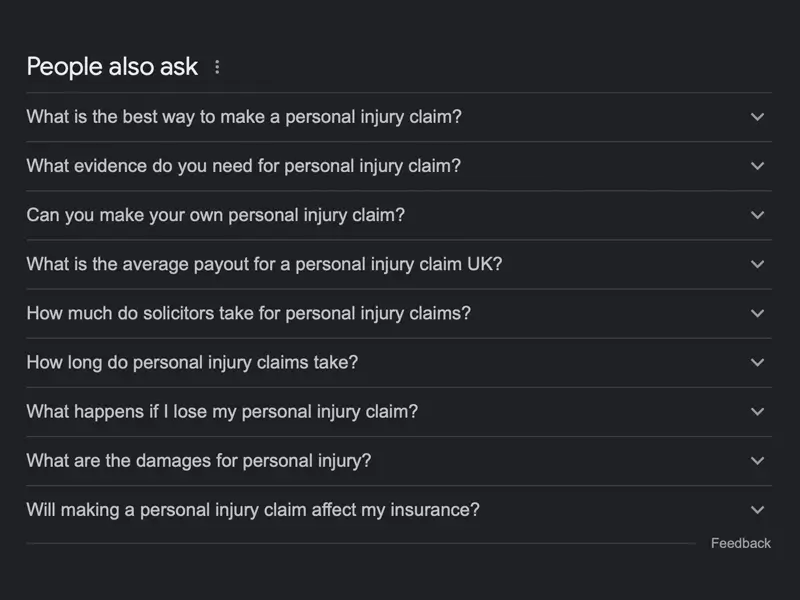
An optimised website can also get you a better ROI on your search ads. It’s not a secret that PPC and SEO can work together to reduce ad costs.
Do I need to hire a marketing team?
While hiring a full-time marketer may seem like the obvious solution, there are benefits to outsourcing an agency like us.
- Access to a team of digital marketing experts with diverse specialities and a wide range of skills and experience. We can provide you with a wider range of services and strategies than just one person.
- Fresh perspective and new ideas. A new set of eyes and perspective can be beneficial if you have been struggling.
- It’s cost-effective. Hiring a full-time employee can be costly, especially when it comes to benefits and salaries. An agency can provide the service at the fraction of the cost of hiring an employee.
- We have the resources to stay up-to-date with the trends and technologies. The marketing landscape constantly evolves and you need to stay ahead of the curve to be successful.
In the case study we mentioned earlier only one SEO expert works on their website. Though, the firm benefits from access to our entire team.
When they have questions related to web design, social media advertising, Google PPC advertising, or any other marketing query, we are always there to help.
Basics of Legal SEO
The primary categories of SEO actions
SEO is not just about writing blogs. It is a complex process of optimising your website and content (including images) to achieve higher organic search engine rankings.
Blogging will only generate traffic for your law firm’s website when it’s combined with other SEO actions.
SEO can be divided into the following 4 main categories:
- On-Page SEO: includes web design improvements, content and keyword strategy creation, and content audit.
- Off-Page SEO: this includes link building and other tactics to improve your website’s authority and reputation on the internet.
- Local SEO: includes managing your Google My Business profile, local keyword strategy and local PR and link building. It can be a part of your off-page strategy.
- Technical SEO: this focuses on the user experience (UX), optimisation of your website and design, and site security.
When you use SEO services, you should expect your SEO expert to perform some (but ideally all) of the above actions to help your law firm gain organic visibility.
What needs optimising on my law firm website?
While on-page SEO, blogging and content optimisation are important, alone they will not increase your visibility.
You need to ensure the technical side of your website is also in good health, and compliant with Google’s requirements.
Optimising the following factors can result in better visibility, more visitors and paying clients for your firm:
Google’s content guidelines
There are certain criteria your law firm’s website content needs to meet to show in organic search results.
First, your content needs to be helpful.
Second, you need to be able to show your legal expertise, authority and trustworthiness (EAT).
You can achieve this by writing the content by yourself and then having it optimised by a legal SEO expert.
If you don’t have the time to write yourself, you can collaborate with someone to produce your copy. Some SEOs (including our team) do that.
Office location pages
Even if you are based in a rural location in England or Wales, you are still able to provide legal services to clients based on the other side of the country.
All the more now that remote hearings have become common.
Office location pages help visitors to know your location, whether they can visit you in person to talk about their legal issues, and are a good resource page for enquiries.
They can also help you rank for location-based keywords.
Generally speaking, location-based keywords usually have a lower search volume. But people searching for location-based queries are more ready to make an actual enquiry.
Creating location-based pages on your website can help you rank for more keywords, reach your target audience and generate more enquiries.
Creating pages for surrounding areas, e.g. closest cities to you, also gives you an opportunity to reach potential clients who are based further away.
The importance of service pages
You may know the importance of service pages – they help visitors understand what legal services you offer.
However, they also have another, significant role in helping the web crawlers understand your website structure.
You can design the structure of your services pages in various ways.
But, you will generally want to start off with a main service page, and then link additional resources to it.
Good website architecture is crucial to your SEO success.
Good navigation and architecture are crucial for SEO’s effectiveness.
An example of a good structure is:
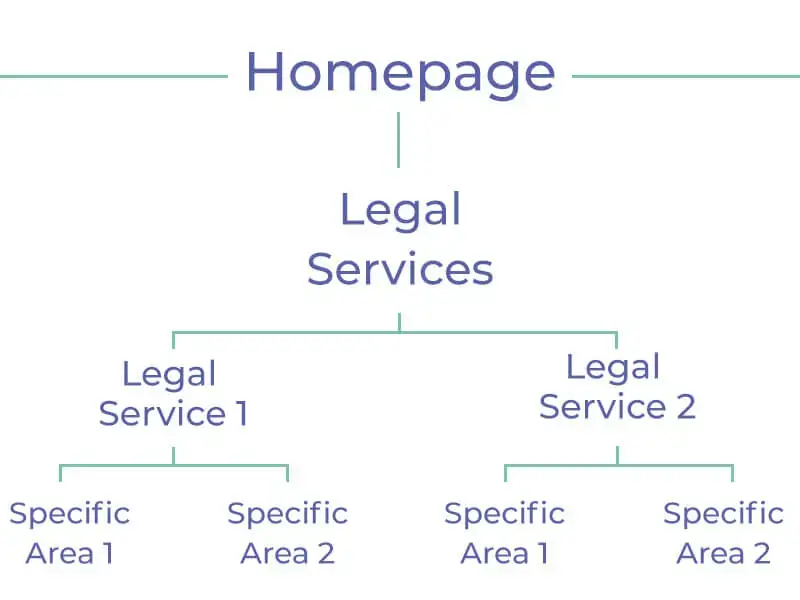
Blogging for Law Firms
Perhaps you are not keen on blogging because you don’t consider yourself a good writer. Many people don’t.
But, blogging can generate results. And your SEO expert can help you produce them.
If you employ solicitors in your firm, you could also get them to collaborate with your SEO expert to produce more content.
The reason why blogging is important is that your blog is the place where you can share additional content with your visitors.
Our SEO has previously dealt with a law firm that had created over 60 blogs over the course of 3 years. They were not generating any work because they were not ranking, but we put them to work.
By repurposing the old content and optimising it for Google, the firm gained a number of enquiries.
If you are not a born writer, it may not be easy for you to create written content. You may be more used to dealing with complex legal documents and writing extremely dense texts using legalese.
But writing for your website gets easier with time. Especially when you have somebody to help you with it, who will do keyword research and tell you what prospective clients search for.
Our team use various keyword research tools and social media to find the right keywords and topics.
Relevant, useful and helpful content that shows your expertise attracts traffic.
Page heading tags (H1, H2, H3, H4…)
On the face of it, heading tags only change the size of the text.
But their role is much more significant than that.
Page heading tags help search engine crawlers analyse and make sense of your web pages.
Including your target keywords in header tags signals to Google what your page is about.
Optimised pages should always start with the H1 tag. This tag should contain the keywords you are optimising the page for.
Any related keywords should go into your H2 tags.
You can use H3 tags for keywords of smaller importance and with less volume.
Like in any book: the H1 should be treated like your title. The H2 like the subheading. The H3 should provide more specific information related to H2, and so on.
Meta titles and descriptions
While we are on the topic of keywords, you will also want to include them in your meta tags and meta descriptions.
They appear in search results and webpage tabs (in your browser) and tell your visitors that they landed on the right website.

Want to learn more about On-page SEO?
If you are completely new to law firm SEO, read our guide to SEO.
What needs optimising off-page?
Off-page SEO is the type of SEO that impacts your ranking but is not visible at first glance.
If you have bad off-page SEO, no matter how much on-page SEO you do, your website will not achieve its full potential.
Continue reading to find out how to ensure you improve your website’s authority and reputation using Off-page SEO.
Law firm’s Google profile
If you don’t have one, set up your Google Business profile as soon as you can.
Your Google Business profile gives your law firm visibility to your local audience.
It can help your prospective clients get information about your legal services quickly and help with your search ranking, too.
Google Business profile allows your firm to appear for location-based search queries. This can get you more clicks and clicks can result in new clients.
If you now search for something like ‘divorce solicitors near me’, you will see family law firms offering divorce services located near you.
If you have multiple offices in different locations, you can set up a profile for each one increasing your visibility even further.
Make sure that the information in each profile is correct. Consistency is key.
Inconsistent information about your law firm can lead to your firm not getting in the top 3 positions of the so-called ‘local pack’.
It may sound like setting this up is a lot of work. However, it’s definitely worth it.
If you work or are looking to work with an SEO, ask them to set this up for you.
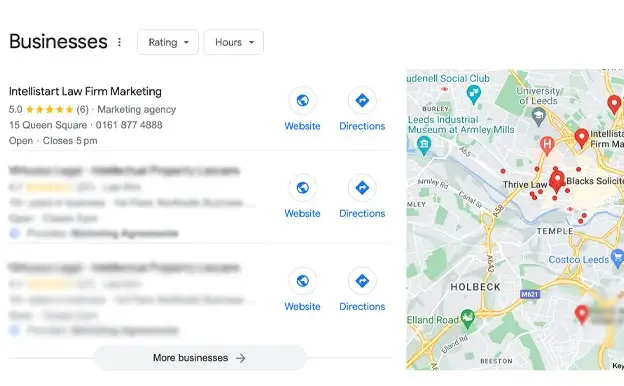
Improving authority through link-building for law firms
Having other respectable domains linking to your domain (backlinks) is one of the more important Google ranking signals at present time.
Ranking signals dictate where your website is going to be placed on the search results pages.
The rule is that the more reliable and trusted websites link to your website, the better.
As a law firm owner with several years of PQE, you are an expert on difficult legal topics.
By sharing your knowledge with others through blogging or doing interviews with small news outlets, you can obtain good backlinks.
There will always be other websites out there looking for a quote from a legal expert like you.
- Although backlinks are important and can improve your authority score, don’t try to speed up the process of building authority by buying them.
Buying backlinks can lead to your website being listed on spammy websites. This will most definitely hurt your SEO efforts.
Worse, Google can penalise you for this tactic. Getting a penalty will prevent your law firm’s website from showing in search rankings.
Use a free tool such as Ahrefs backlink checker to see your backlink profile. An experienced SEO can help you keep it healthy.
Backlink tactics for law firms
Here are some common backlink tactics that could work for your law firm:
- PR press releases whenever something good happens at your firm,
- Sponsor a local group or event to get backlinks on their and news outlets’ websites,
- List your law firm on popular local directories,
- See if you can guest post on someone else’s website,
- Find broken backlinks in your niche area of law and request if they can be updated with a backlink to a relevant page on your website,
- Find mentions of your law firm on the internet – if they contain no hyperlinks, ask for them,
- Blog – creating helpful resources on your website can naturally get you new backlinks without the need to contact anybody. Plus you might get some organic keywords.
Social media and social media advertising
Not all law firm owners have the time to create vlogs or write long social media posts.
However, social media platforms are worth using. They can help you connect with prospective clients who otherwise wouldn’t come across your firm.
If you don’t regularly post on social media, try:
- Promoting your existing and new website content, e.g. aforementioned blogs. They can direct new traffic to your website!
- Asking satisfied clients to leave reviews of your services. This may lead to better SEO results as reviews prove to your existing clients that you are the right firm for them.
As a bonus, a social profile on a platform such as Facebook may be a useful tool if you want to run a PPC campaign. But more about this in our in-depth guide to PPC for law firms.
Technical SEO for Law firms
To be successful, your website needs to have good technical SEO.
Good technical SEO can help search engine crawlers make sense of your website.
And humans, it can help them find what they are looking for.
We do always emphasise this: certain aspects of technical SEO are very hard.
To prevent damaging your website’s health indefinitely, we strongly recommend using an experienced SEO to carry out the fixes.
Here’s what you could expect a good SEO to do on your website…
Work on Website Navigation and Architecture
We have recently published a blog about how information architecture combined with SEO can help your law firm.
Good technical condition of your law firm’s website is an integral part of any successful SEO campaign.
Imagine this scenario.
You own a personal injury firm in Manchester.
A local prospect finds you on Google by searching ‘No win No fee Personal Injury Firm in Manchester’.
They are looking for a solicitor to help claim compensation following a car accident they were a passenger in.
They click on the link to your website to find out if you can help.
They end up on your homepage, look at the main menu, but the link to you passenger RTA claim page is nowhere to be seen.
Thinking that you don’t assist with passenger RTA claims, the prospect leaves your website and goes to your competitor’s website instead.
This story also illustrates how web crawlers check your website.
If your website is missing navigational breadcrumbs and subfolders (pages) are more than three or four levels deep, search engine crawlers may completely miss them.
If crawlers can’t crawl all of your pages, they will not be able to index them either.
This means pages won’t show up in Google search results.
Orphan pages
Orphan pages are web pages that are not linked to any other pages on your website.
Because they are not linked, this makes it difficult for users to discover them or navigate to them.
Orphan pages can harm your website in the following ways:
- User experience: Orphan pages lack navigational links, making it difficult for users to find related content or return to the main site.
- SEO: Orphan pages are not linked from any other pages, so search engines may have trouble finding and indexing them, leading to decreased visibility in search results.
Ensuring that your website doesn’t have orphan pages is essential.
Google Core Web Vitals
There are hundreds of factors Google takes into account when ranking your website.
While many of them are kept secret, the one that Google want you to know about is the Core Web Vitals.
Core Web Vitals is a set of metrics that helps Google’s algorithm decide whether you meet its requirements and if so, where to place you on its search results pages.
The three main measurements that make up the Core Web Vitals are:
- Cumulative Layout Shift (CLS)
- First Input Delay (FID)
- Largest Contentful Paint (LCP)
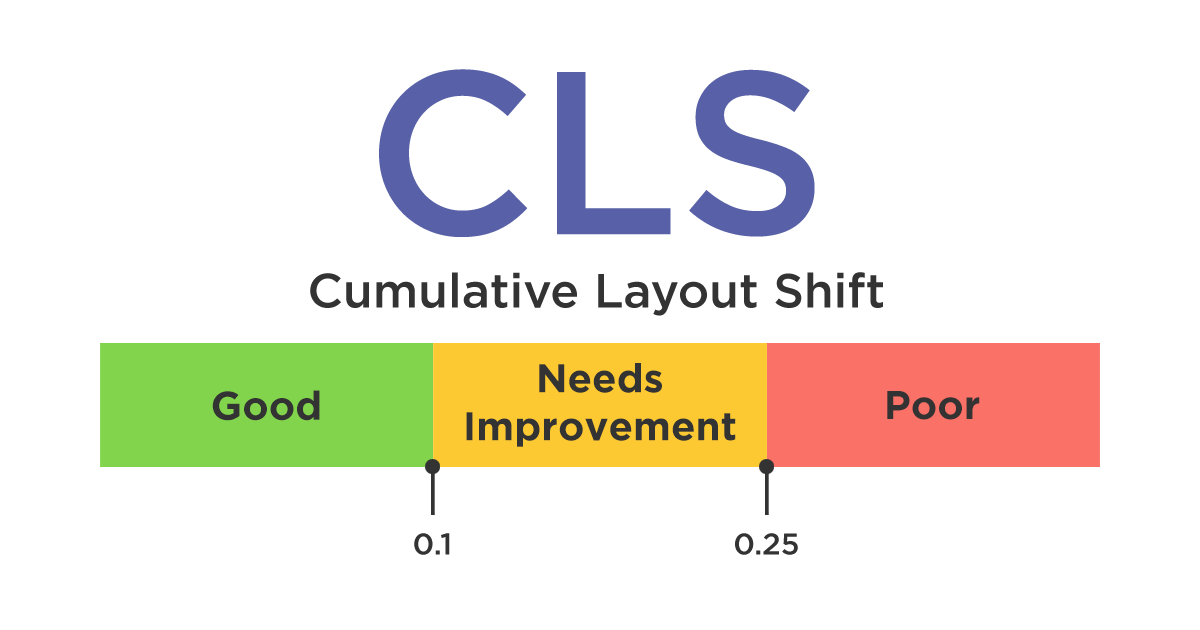
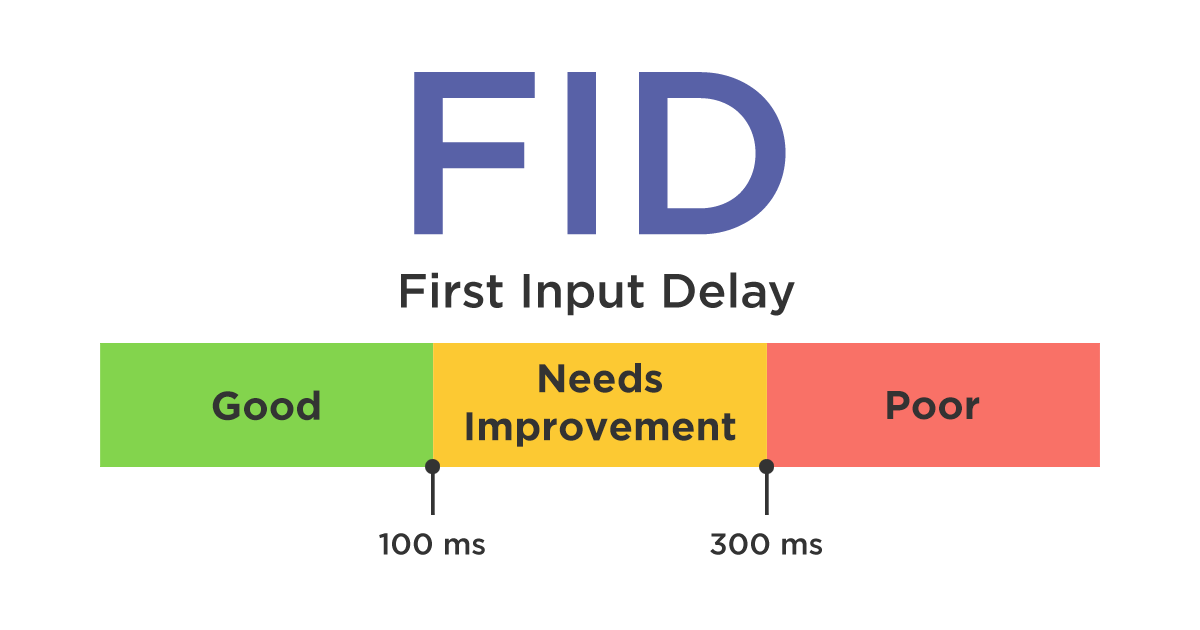
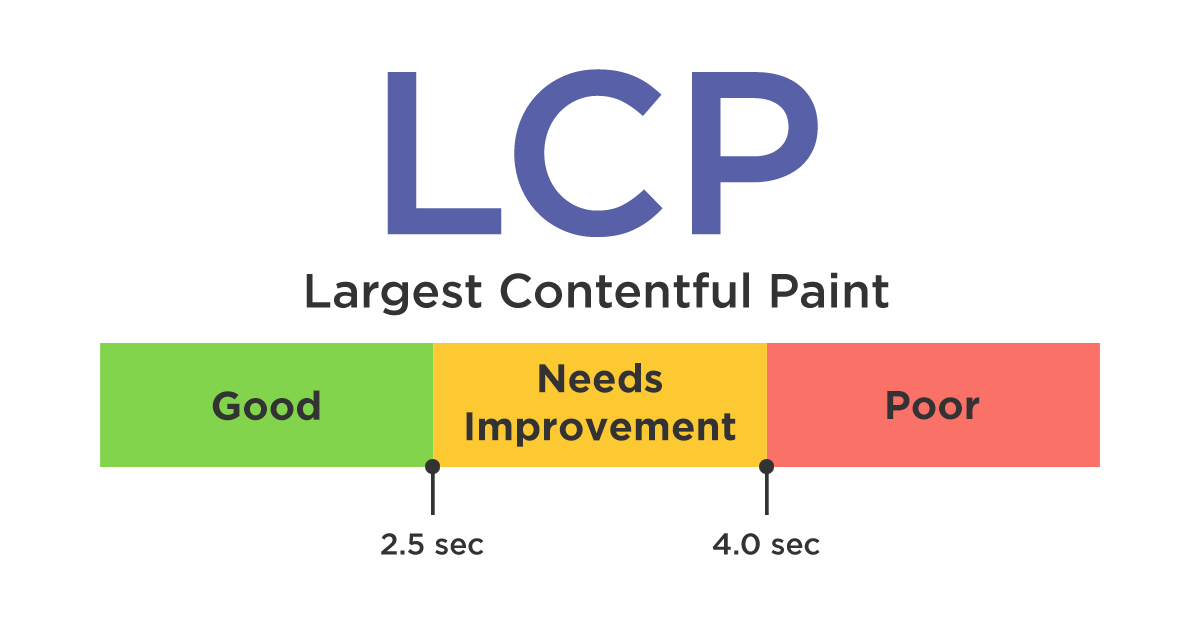
If your website doesn’t meet the Core requirements, Google won’t include it in its search results.
Last year, we audited the top 200 UK law firms to see how their websites were performing.
The results were surprising. The top law firm – DLA Piper – averaged 44 out of 100 for mobile and desktop speed.
You may be wondering how can a firm like yours compete with the likes of DLA Piper.
With the help of an experienced SEO, a good SEO strategy in place and a fast loading website, you could get ahead of the top firms in many niche practice areas.
Heavy code in WordPress website
While your website may have been beautifully designed in WordPress (WP is the most popular Content Management System), it may be weighed down by heavy code.
Research shows that 40% of people abandon a website if it takes longer than 3 seconds to load.
The five ways to cut heavy code on your law firm’s WordPress website are:
- Minifying JS and CSS files,
- Choosing a lightweight theme,
- Removing unused or unnecessary plugins.
Best to ask a technical SEO to do this as removing too much code or plugins that are necessary for your website’s functionality, may result in permanent damage.
Adding structured data (Schema markup) to your law firm website
Adding structured data (Schema markup) helps search engines read and understand your website.
The additional code describes elements on your website which can help you get extra space on the search engine results pages with:
- Overall review rating
- Opening hours
- Office address
- FAQs
- Phone number
Adding a markup can help you prove to your prospect that you are the right match for them.
As with everything, though, the decision to display your site links and other features is solely decided by search engines.
However, it is best to ensure that your website at least stands a chance to feature-rich results, review ratings, and extra site links.
As changing your website’s code can be tricky, and while not impossible to do it yourself, we would recommend leaving this task to somebody who has knowledge about web development.
Tracking the results of your marketing efforts
To be able to know if your SEO efforts are effective and generating a good ROI, you need to track the results.
While you can use various SEO tools and Google Analytics to see what areas need improving, or to find opportunities to improve, the ultimate measure of success for any law firm is new clients.
Seeing traffic to your website, clicks and impressions alone is not enough.
Tracking your results with Customer Relationship Management (CRM) Software
As a law firm, you likely have some type of case management system in place.
But, that is generally reserved for paying clients.
If you use your case management system for new enquiries, you have to follow certain steps to close their file.
This takes extra time out of your diary.
This is exactly where a Customer Relationship Management system can help.
You can use it for new enquiries before you add them to your case management system. And as a bonus, a CRM can help you track the progress of your SEO (and PPC) campaigns.
A good CRM allows you to track the source of all new enquiries (whether they are organic, paid or direct) and helps you easily track your progress.
Ultimately, impressions and clicks don’t matter if they don’t result in new work and clients.
Using Google Analytics to find areas to improve
Once installed on your website, Google Analytics tracks your law firm website’s visitors.
It can tell you the exact number of visits you get each day and which pages are the most popular.
Google Analytics also allows you to set up conversion tracking.
If used together with a CRM, it can show you your most valuable content.
Moreover, you can find the pages and content that need improving.
Other tracking and measuring tools
There are several paid tracking tools available to use to track your law firm’s website success.
They allow you to track specific keywords, get keyword ideas and identify gaps in your competitors’ strategies.
If you outsource a professional SEO, they will likely have access to a number of paid tools and features your firm will benefit from.
The ultimate measure of success, however, is the number of enquiries your website generates.
Use Google Analytics and a CRM to track your law firm’s SEO progress.
How to find a good Law Firm SEO expert?
There’s a chance that you have already tried SEO and it didn’t generate any satisfying results.
You might also be questioning why we are telling you to invest in an SEO specialist without understanding exactly what they are doing.
But similarly to an accountant or an IT expert, you don’t necessarily need to know how they achieve their results and what tools they use.
The one thing that matters is the results for your firm – new clients.
It helps to find an SEO with experience in your industry.
The needs of law firms are different to the needs of an online fashion brand or a restaurant.
Furthermore, if you are doing any PPC advertising, you can’t ignore SEO.
SEO can make it more affordable and help you spend less.
To get the best results, choose an agency that has the experience and understands your industry and is able to generate results for both PPC and SEO.
Can I compete with larger law firms?
It is true that you may not be able to compete with the largest and most-known law firms in all areas.
Ranking above firms like Irwin Mitchell, for keywords such as ‘personal injury solicitor’ may be impossible.
This is because they get the publicity and PR that smaller law firms simply cannot afford.
Being quoted by the most popular news outlets, such as The Telegraph or The Guardian, does positively affect the website authority needed to rank at the top.
However, finding weaknesses in your competitor’s approach can help you and your SEO gain a competitive edge in many other areas.
Having a fast, optimised website with good quality and useful content can help you achieve this.
There are thousands of law firms in the UK that don’t regularly maintain their websites. And the internet is vast – and so is the number of search queries Google users make every day.
Minimise any website issues, like excessive code and uncompressed images, maintain your website and create content.
All of this will help you improve and start generating affordable work through your website.
